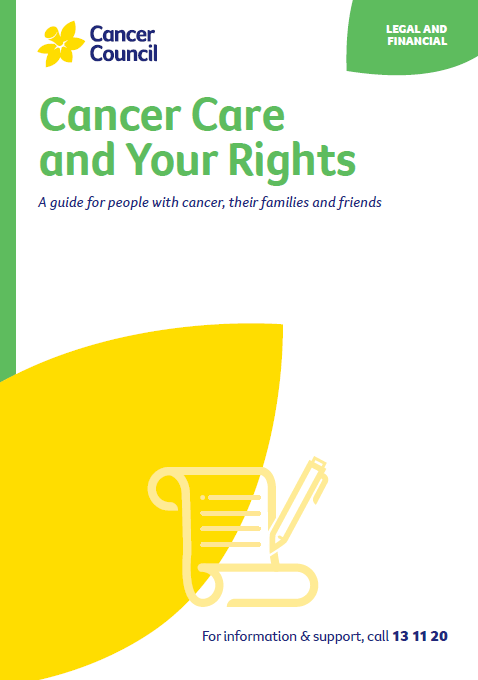- Home
- About Cancer
- Coping with a diagnosis
- Cancer care and your rights
- Insurance, financial and workplace concerns
Insurance, financial and workplace concerns
Get insights into insurance, financial, and workplace concerns related to cancer. Learn about your options and seek legal and financial advice for your specific situation.
For more on this, see Cancer, work and you and Cancer and your finances.
Learn more about:
Insurance
Personal insurance and claims
Before your diagnosis, you may have taken out personal insurance policies (e.g. income protection or total and permanent disability) or you may have insurance through your superannuation. If your policies cover your situation, it’s important to make a claim as soon as possible because time limits may apply.
If you think you should be covered but your claim is denied, contact the Australian Financial Complaints Authority. You can also call Cancer Council 13 11 20 to see if we can connect you with a lawyer for assistance.
Informing your insurer about a cancer diagnosis
If you’re not making a claim, you don’t usually need to inform the insurer about your cancer diagnosis until you renew your policy or change your level of cover. However, it is a good idea to check what your insurance policy says about telling the insurer about health issues.
Applying for a new insurance policy
When taking out a new policy, you generally need to provide your medical history, including cancer diagnosis. Insurance companies can refuse cover, but only on reasonable grounds.
Private health insurance coverage
Private health insurance is different from other types of insurance. It is unlawful to be denied health insurance due to health issues, such as cancer. However, there may be a waiting period before pre-existing conditions are covered.
Download our fact sheets on Insurance and Superannuation.
Travel insurance
Challenges of getting travel insurance with cancer
Getting travel insurance can be a major concern for people with cancer or who have had cancer, as cancer is generally considered a pre-existing medical condition. Insurance companies may view you as more of a risk. They may believe that you’re more likely to get sick and require treatment while you’re travelling, or need to return home for treatment, or cancel your trip due to illness.
Coverage for non-cancer-related issues
In general, you should be able to buy travel insurance for things that are not related to your cancer (like lost luggage, theft and cancelled flights). It may be difficult to buy travel insurance that covers cancer-related medical issues, but you should be able to get coverage for medical costs not related to cancer.
Disclosure of pre-existing conditions
If you have to tell them about any pre-existing health conditions, it’s important to be honest – a claim may be denied if you withhold information.
Download our fact sheet on Insurance and cancer.
How to get travel insurance
- Apply for a policy well before your departure date.
- Shop around – the terms and conditions may vary.
- Ask your specialist or GP to write a detailed letter outlining your condition.
- If you are travelling overseas, check whether there is a reciprocal health care agreement between Australia and the country you are visiting that covers some of the costs of medical treatment. For more information, visit Services Australia and search for “reciprocal health care agreements”.
- Some credit cards offer free travel insurance if you use the card to pay for some or all of the trip. Read the fine print.
- If you are denied travel insurance, ask the insurer to provide reasons in writing.
Podcast: Coping with a cancer diagnosis
Listen to more of our podcast for people affected by cancer
More resources
Prof Sarah Lewis, Faculty of Medicine and Health, The University of Sydney, NSW; Kevin Bloom, Senior Social Worker, Haematology and Bone Marrow Transplant, Royal North Shore Hospital, NSW; Danielle Curnoe, Consumer; Alana Fitzgibbon, Clinical Nurse Consultant – Gastro-Intestinal Cancers, Cancer Services, Royal Hobart Hospital, TAS; Hall & Wilcox (law firm); Johanna Jordaan, Consumer; Dr Deme Karikios, Medical Oncologist, Nepean Cancer and Wellness Centre, Nepean Hospital, NSW; Melissa Lawrie, Breast Cancer Clinical Nurse, Cancer Services, Gold Coast Hospital and Health Service, QLD; Jacqueline Lesage, Consumer Reviewer, Cancer Voices NSW; McCabe Centre for Law and Cancer, VIC; Louise Pellerade, 13 11 20 Consultant, Cancer Council WA; Andrew Potter, Consumer; Siân Slade, PhD Candidate, Nossal Institute for Global Health and Non-Executive Director (health, disability sectors), VIC; Paula Watt, Clinical Psychologist, WOMEN Centre, WA.
View the Cancer Council NSW editorial policy.
View all publications or call 13 11 20 for free printed copies.

